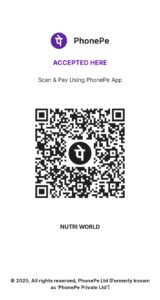The Advanced Diet Plan Making Program by Nutri World is a comprehensive course in therapeutic nutrition. It covers disease management, diet counseling, and patient follow-up, helping students create personalized diet charts that meet global and local standards. This program equips aspiring nutritionists and dietitians with practical skills for a successful career in dietary management.
Join Us and Start your journey to becoming a successful dietitian today
Advantage
✅ Learn diet planning for IBS, GERD, and other GI conditions.
✅ Create personalized meal plans for hormonal health.
✅ Gain expertise in fatty liver disease and cirrhosis nutrition.
✅ Address the unique dietary needs of pregnant women and lactating mothers.
✅ Design age-appropriate meal plans for optimal health.
✅ Manage hypertension and cholesterol through proper nutrition.
✅ Learn diet strategies for CKD and dialysis patients.
✅ Develop counseling techniques for obesity and underweight concerns.
✅ Explore nutrition’s role in Alzheimer’s, epilepsy, and brain health.
✅ Design recovery-focused diets for enhanced immunity.
Course Modules
MODULE: 1- GASTROINTESTINAL DISORDERS
MODULE: 2- ENDOCRINE DISORDERS
MODULE: 3- LIVER DISORDERS
MODULE: 4-SPECIAL CONSIDERATION
· Pregnancy & Lactation
· Geriatrics
MODULE: 5 CARDIOVASCULAR DISEASES
MODULE: 6 ONCOLOGY NUTRITION
MODULE: 7 KIDNEY DISORDERS
MODULE: 8 NEUROLOGICAL DISORDERS
MODULE: 9 NUTRITIONAL MANAGEMENT OF INFECTIONS & FEVER
MODULE: 10 SELF-GROOMING SESSION
· CV Format Guide
· Interview Cracking Easy Techniques
🔹Build a Rewarding Career in Dietetics & Nutrition
✅ Work in diverse settings – hospitals, clinics, wellness centers, research, and private practice.
✅ Handle clients globally with expert diet counseling and follow-up strategies.
✅ Master 1:1 patient consultations for better health outcomes.
🔹Additional Skills You’ll Develop
📌 Public Speaking & Presentations – Conduct nutrition workshops & awareness camps.
📌 Therapeutic Diet Planning – Manage neuro, cardiovascular, renal, liver & GI disorders.
📌 Resume Enhancement – Highlight new certifications & expertise to boost career opportunities.
Step-1
Step-2
Payment Details
A/C No- 0598202100000654
IFSC Code-PUNB0059820
Name - Nutri World
Branch- Punjab National,Kakdwip
Bank - Punjab National Bank
UPI ID: 9647372176-1@okbizaxis
Facebook Link: https://www.facebook.com/20nutriworld
Google Pay :9647372176
Phone Pay: 9647372176

Important Note
AfterPayment take a Screen shot and send us so we can validate your registation, without payment proof your registation will not be activated.
FAQ
1. What are common gastrointestinal (GI) disorders?
Common GI disorders include acid reflux, irritable bowel syndrome (IBS), Crohn’s disease, ulcerative colitis, and celiac disease.
2. What foods should be avoided in acid reflux?
Spicy foods, caffeine, alcohol, citrus fruits, and fatty foods can trigger acid reflux.
3. What dietary changes are recommended for hypothyroidism?
Include iodine-rich foods (e.g., seafood) and selenium (e.g., nuts), and avoid goitrogenic foods (e.g., raw cruciferous vegetables) in excess.
4. Can diet help with PCOS?
Yes, a diet low in refined carbs, high in fiber, and rich in lean proteins can help manage insulin resistance and hormone imbalances in PCOS.
5. What diet is recommended for fatty liver disease?
A diet low in saturated fats, refined sugars, and alcohol, and high in fruits, vegetables, and whole grains is recommended.
6. What foods should be avoided in liver disorders?
Avoid alcohol, processed foods, fried foods, and excessive salt.
7. What are the key nutrients during pregnancy?
Folic acid, iron, calcium, vitamin D, and omega-3 fatty acids are essential.
8. How many extra calories are needed during pregnancy?
An additional 300-500 calories per day are recommended, depending on the trimester.
9. What foods should be avoided during pregnancy?
10. What are common deficiencies in older adults?
Vitamin D, calcium, vitamin B12, and iron are common deficiencies.
11. What are the best foods for lowering cholesterol?
Oats, nuts, fatty fish, and foods high in soluble fiber can help lower cholesterol.
12. Can kidney disease be managed with diet?
Yes, a proper diet can slow disease progression and manage symptoms.
Avoid high-potassium foods (e.g., bananas, oranges), processed meats, and high-phosphorus foods (e.g., dairy, soda).
13. How does nutrition affect neurological health?
Nutrients like omega-3s, antioxidants, and B vitamins support brain function and may reduce the risk of disorders like Alzheimer’s.



